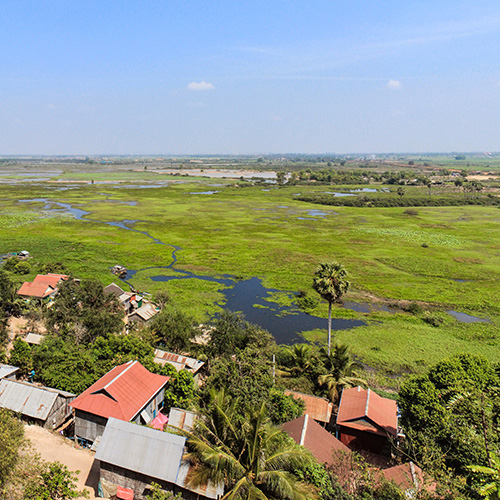Stories of Change

Countryside outside Siem Reap, Cambodia.
CWS programs in Cambodia reached more than 21,000 people in 83 communities last year.
Source: CWS Annual Report 2017
Facing the Complex Challenges of Poverty in Rural Cambodia: Hope Springs Eternal
Nhep* and her husband Oeun* lead one of seven landless families in their village in western Cambodia – and being landless is only one of the challenges they face.
Nhep and Oeun have five children ranging from three to 20 years old. One of their biggest challenges is the fact that Nhep, Oeun and their 10-year-old daughter are living with AIDS. AIDS is a now-silent health crisis that affects tens of thousands of poor families across southeast Asia, particularly when male heads of household must become itinerant wage labors living far from home for long periods of time.
Unfortunately, some of these men engage in unsafe sex with commercial sex workers – as Oeun did some years ago. Returning home after one long time away, and not knowing he had contracted HIV, Oeun gave the infection to Nhep; then, before either of them became symptomatic, Nhep transmitted the virus to their unborn daughter.
If there can be any good news for a family facing such a disaster, it is that Oeun, Nhep and the baby were diagnosed early enough to receive antiretroviral treatment … which is working for them all. Their youngest child was born without HIV, and their 10-year-old is doing alright, too. Oeun is also able to work again, adding his wages to those that two teenage sons and a son in-law earn. That income is important for the impoverished family – each laborer earns about $6 every day that they work, which they do so as illegal migrants just across the Cambodian-Thai border. Since this work is seasonal, the family still does not have enough to eat sometimes, which is especially bad for the young children.
Because of their very difficult situation, this family was one of seven living on public lands that came to the attention of CWS partner Rural Development Association about a year ago. Since then, they have been working together to improve their lives through joint water, sanitation and hygiene education sessions, where they learned about water treatment options, personal hygiene and environmental sanitation, including the harm of open defecation. They also had a chance to bring their young children for nutrition assessments, which is where RDA met Nhep and her three-year-old. The child was a bit malnourished, but able to grow strong once he and his mom joined in improved-feeding sessions.
Along with their education, the families also received water filters and support to build sanitary latrines. Nhep expressed her special appreciation for the support saying, “Because three of us are living with AIDS and now know how important good hygiene is for our health, I am so glad we now have clean water and better sanitation [which we could never afford on our own].” With better health the family spends less money on medical check-ups and treatments, so they can buy rice and other basic food, at least.
Though the future remains quite uncertain for Nhep and her family, CWS and RDA team members are quite inspired by her efforts to improve their lives and, with continued funding partners’ support, all are committed, together, to seek a better life, especially for the children.
*Names were changed to protect identities.
